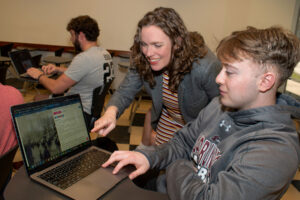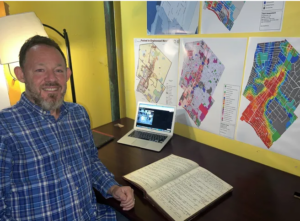- About Ramapo
- Academics
- Admissions & Aid
- Student Life
- Athletics
- Alumni
- Arts & Community
- Quick Links
- Apply
- Visit
- Give
School of Humanities and Global Studies (HGS)
February 2, 2024Building Community and Preserving History Through Digital Humanities

Sarah Koenig
The National Endowment for the Humanities awarded Dr. Sarah Koenig, assistant professor of history, approximately $150,000 to develop digital humanities communities of practice (CoP) at Ramapo College. The grant is the largest awarded in New Jersey this cycle and will support training not only for faculty and students, but for members of partner communities including local public schools and the Ramapough Munsee Lenape Nation.
“This grant builds on existing digital humanities initiatives at Ramapo College and will provide ongoing support to develop these separate initiatives into a comprehensive and enduring digital humanities program at Ramapo College,” said Koenig. Since 2019, Koenig has developed three DH projects: Mapping the Ramapough Munsee Lenape Nation, Mapping the Wild West in New Jersey, and Making Modern New Jersey. She has assisted with two others: The Human Side of a Pandemic and the Penny Colman Collection of Historical Landmarks of Women.
Additionally, the grant supports training programs that enable our faculty and students to collaborate with community partners. These initiatives help to safeguard and share the rich histories of various communities. Ramapo faculty and students are currently immersed in compelling digital humanities projects focused on preserving and showcasing the histories of groups such as the Ramapough Munsee Lenape Nation and Englewood’s Fourth Ward. These communities possess invaluable narratives covering the founding of the American nation, the evolution of civil rights, environmental racism, and more. Leveraging digital humanities platforms empowers these communities to safeguard and present their histories authentically.
Koenig is proud about this grant and what it means for Ramapo College and the community. “This grant shows that Ramapo’s strengths—a liberal arts education, a collaborative spirit among faculty, robust opportunities for student research and community involvement—are being recognized by outside institutions.” She went on to explain how the National Endowment for the Humanities process is not just about having a good idea; it is also about showing that your institution can support that idea, adding, “I think the NEH reviewers saw the compatibility between this grant proposal and the values and strengths of the college more broadly.”

What are the Digital Humanities?
Digital humanities is an exciting hybrid field that combines the methods of the humanities: critical inquiry, close reading, qualitative research, creative writing, etc., with digital tools such as mapping, blogging, podcasting, and digital exhibits, in order to expand understanding of the humanities, create public-facing humanities projects, and critically engage with technology. Ramapo College creates opportunities to with community members to learn about the digital humanities such as the Passaic County Community College-Ramapo College Experiential Learning and Digital Humanities Conference held on January 26.
Using Digital Humanities Technology
Faculty in the School of Humanities & Global Studies utilize digital humanities technology and diverse humanistic research approaches to produce scholarship accessible to the public. They collaborate with community groups to create applied humanities projects aimed at preserving community knowledge, encouraging public inquiry, and nurturing literacies in digital, informational, historical, and cultural domains. Through research projects and digital course assignments, faculty provide Ramapo students with hands-on learning experiences, allowing them to develop a profound understanding of their subject matter and acquire valuable, marketable skills.
The Importance of the Digital Humanities
Integrating digital tools into a humanities education equips students with a comprehensive skill set, positioning them effectively in a dynamically evolving job market. “The humanities are not only compatible with but essential to emerging technologies, because the critical thinking, deep analysis, and attention to culture that the humanities provide help us to use digital technologies in more equitable, thoughtful, and creative ways,” shared Koenig.

David Colman
Hands-On Learning Opportunities for Students
One of the most exciting parts of this grant is that Ramapo students will be involved at multiple levels. Students will work as student-faculty researchers on specific digital humanities projects, such as Englewood Makes History, the Penny Colman Collection, and Mapping the Ramapough Munsee Lenape Nation. Students not only within the School of Humanities & Global Studies, but across the college will learn digital humanities methods and participate in digital humanities projects as the technology is integrated into more courses in the Ramapo curriculum.
Categories: Faculty News, Faculty-Student Research, Grants and Awards
Copyright ©2025 Ramapo College Of New Jersey. Statements And Policies. Contact Webmaster.

Follow Ramapo